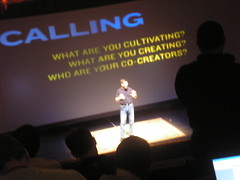 Our second speaker was Andy Crouch, editorial director of ChristianVisionProject.com for Christianity Today and author of the upcoming book, Culture Makers. Andy was a great choice for the first presentation after Gabe Lions because his topic really began to set the stage for where we were going to be going for the week.
Our second speaker was Andy Crouch, editorial director of ChristianVisionProject.com for Christianity Today and author of the upcoming book, Culture Makers. Andy was a great choice for the first presentation after Gabe Lions because his topic really began to set the stage for where we were going to be going for the week.
Crouch essentially had two major points: the difference in life between postures and gestures, and the ideas of culture being cultivated versus created.
Crouch finds that in recent history the cultural channel of the church has had four major postures. The first was the Fundamentalists, who chose to condemn culture. The next were the neo-evangelists, who sought out culture to critique it.
His next major movement resided with the Jesus Music Movement, using the example of Larry Norman. At this point in time the church chose to copy culture. Take the sounds of the surrounding culture, sanitize it for our ears, and then call it new. Finally, we are currently caught in to posture of consuming culture. To quote a later presentation (there are several concepts and theme that are being woven throughout the speakers – it seems unintentional, but it’s happening), for every hour of Christian music we listen to, a Christian will watch two hours of Lost or Borat.
The biggest issue with these postures is that humanity (specifically, the human body) is not meant to live in postures and stay in that pose. Instead, if you have good posture (back straight, no slouching and all that), you have the ability to use a full range of gestures in better ways. There are reasons and times to use these different gestures:
1. Condemn – Things that we just know are wrong don’t need to have a committee meeting. We shouldn’t need to dialogue whether or not the Nazi actions of oppression should be condemned.
2. Critique – Much of art is made to interact, not simply be consumed. The creator wants a dialogue with those who view his/her art. They want the art they created to create thought, not simply be consumed.
3. Copy – By copying, new ideas can be infused into the forms that are available, creating new opportunities.
4. Consume – Some things are made simply to be enjoyed. Bread is infused with leaven so that it can be eaten.
On top of these postures/gestures we have to also look at two other concepts: cultivating and creating. Gen 2:15 reads:
The Lord God took the man and placed him in the Garden of Eden to work it and watch over it. (HCSB) The key here for Crouch is that Adam was placed in a garden; not the wilderness or a desert. The garden already was there – it was already cultivated. Culture is already available and there – it’s already cultivated. However, Adam is then charged with the responsibility to name the animals. He is called upon to create. Crouch suggests that whenever we create, we attempt to create in a team of 3. He’s found that a core group of 3 will spread influence to 12 committed people. Those 12 committed to the idea will then spread to a community of 120. Whew. That’s a lot to take in. I like that Crouch takes these negative “postures” we’ve adhered to and turns them around to how they can be powerful, creative gestures. I think we as a society have forced ourselves to believe that we must be in some kind of posture – we must identify ourselves in some way as having some sort of position on subjects. That “this” is what I’m all about. More so, if we change our posture on a subject, we are seen as weak because we didn’t stand true to our beliefs. That somehow, if we change an opinion once or twice or – God forbid – thrice, then we are an indecisive person. I’m not sure what posture I’m stuck in, if I truly am. I would like to think I have good posture and can react and engage with a full range of gestures. It’s hard to tell from my own perspective, though. There are definitely things that I simply consume and don’t worry about how it fits into my worldview of life. And… that’s the end of only my first page of notes.